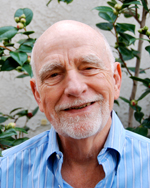|
Tami Simon speaks with Mario Martinez, a clinical neuropsychologist whose breakthrough research examines how cultural beliefs affect our health and longevity. Mario is the founder of biocognitive science, a new paradigm that examines the dynamic relationship between thoughts, culture, and the body. In this episode, Tami speaks with Mario about the idea that culture creates biology; how we can access the antidote to shame, abandonment, and betrayal through healing fields in the body; and the concept of "the drift"—how we can navigate chaos with uncertainty as our guide. Gabor Maté, M.D., When The Body Says No: Mind/Body Unity and the Stress- Disease Connection7/6/2015
Stress is ubiquitous these days — it plays a role in the workplace, in the home, and virtually everywhere that people interact. It can take a heavy toll unless it is recognized and managed effectively and insightfully. Western medicine, in theory and practice, tends to treat mind and body as separate entities. is separation, which has always gone against ancient human wisdom, has now been demonstrated by modern science to be not only artificial, but false. e brain and body systems that process emotions are intimately connected with the hormonal apparatus, the nervous system, and in particular the immune system. Emotional stress, especially of the hidden kind that people are not aware of, undermines immunity, disrupts the body's physiological milieu and can prepare the ground for disease. ere is strong evidence to suggest that in nearly all chronic conditions, from cancer, ALS, or multiple sclerosis to autoimmune conditions like rheumatoid arthritis, inflammatory bowel disease or Alzheimer's, hidden stress is a major predisposing factor. In an important sense, disease in an individual can be seen as the “end point” of a multigenerational emotional process. If properly understood, these conditions can provide important openings for compassion and self-awareness, which in turn are major tools in recovery and healing. Dr. Maté’s presentation includes research findings, compelling and poignant anecdotes from his own extensive experience in family practice and palliative care, and illuminating biographies of famous people such as athlete Lance Armstrong, the late comedienne Gilda Radner, or famed baseball legend Lou Gehrig. The presentation is based on When the Body Says No, a bestselling book that has been translated into more than ten languages on five continents. Gabor Maté M.D. is a physician and best-selling author whose books have been published in twenty languages internationally. His interests include child development, the mind-body unity in health and illness, and the treatment of addictions. Gabor has worked in palliative care and as a family physician, and for fourteen years practiced addiction medicine in Vancouver’s Downtown Eastside. As a speaker he regularly addresses professional and lay audiences throughout North America. His most recent book, In The Realm of Hungry Ghosts: Close Encounters With Addiction, won the Hubert Evans Prize for literary nonfiction. He is Adjunct Professor in the Faculty of Criminology, Simon Fraser University. Gabor Maté M.D. is a physician and best-selling author whose books have been published in twenty languages internationally. His interests include child development, the mind-body unity in health and illness, and the treatment of addictions. Gabor has worked in palliative care and as a family physician, and for fourteen years practiced addiction medicine in Vancouver’s Downtown Eastside. As a speaker he regularly addresses professional and lay audiences throughout North America. His most recent book, In The Realm of Hungry Ghosts: Close Encounters With Addiction, won the Hubert Evans Prize for literary nonfiction. He is Adjunct Professor in the Faculty of Criminology, Simon Fraser University. In this short YouTube video, Dr. Gabor Maté talks about the root causes of addiction and how to deal with them.
A good source to read: In the Realm of Hungry Ghosts - Gabor Mate, M.D. Powerful documentary featuring Bryan Post, Bruce Perry, M.D., Daniel Siegel M.D., Marti Glenn PhD and other renowned experts in the field of childhood trauma, and attachment and bonding. This is a great way to share with friends, colleagues, and caregivers this new understanding of how trauma effects the development of the mind body system, and how it affects children's behaviors and social relationships. This is a popular training video with agencies for training and for group presentations. Copies can be purchased a www.postinstitute.com/dvds. Video originally produced by Santa Barbara Graduate Institute which has since been merged with a major university and no longer exists as a separate entity. This video a basic introduction to Pre and Perinatal Psychology Robert Hilton  Robert Hilton, Ph.D has been in private practice in Orange County, California for 45 years and has taught courses at the University of California at Irvine and San Diego, and the United States International University in La Jolla. In 1972 he co-founded the Southern California Institute for Bioenergetic Analysis where he continues to be a senior trainer. He is a member of the American Psychological Association, the California Association of Marriage and Family Counselors and the International Institute for Bioenergetic Analysis where as a senior faculty member emeritus he lectures at their International conferences as well as teaching throughout Europe, the United States and South America. In addition to his many publications he is the author of Relational Somatic Psychotherapy: Collected Essays of Robert M. Hilton, Michael Sieck, editor. Printable PDF transcript. (Original from: Somatic Perspectives on Psychotherapy) This talk examines how relationships and reflection support the development of resilience in children and serve as the basic '3 R's" of a new internal education of the mind. Daniel Siegel, MD, is Clinical Professor of psychiatry at UCLA, Co-Director of Mindful Awareness Research Center, Executive Director of Mindsight Institute, author, and recipient of numerous awards and honorary fellowships. The Science of Compassion: Origins, Measures, and Interventions, which took place July 19th to 22nd in Telluride Colorado, was the first large-scale international conference of its kind dedicated to scientific inquiry into compassion. The conference convened a unique group of leading world experts in the fields of altruism, compassion, and service to present their latest research. This talk was part of panel Origins and Conceptual Models of Compassion by Stephen Porges, Ph.D. Dr. Dan Siegel of the Mindsight Institute discusses the neurological basis of behavior, the mind, the brain and human relationships in the contect of cities. He explains one definition of the mind as "an embodied and relational emergent process that regulates the flow of energy and information," and describes the role of awareness and attention in monitoring and modifying the mind. He recommends using the notion of health as a means of linking individual, community and planetary wellbeing. Dr. Allan Schore is on the clinical faculty of the Department of Psychiatry and Biobehavioral Sciences, UCLA David Geffen School of Medicine, and at the UCLA Center for Culture, Brain, and Development. Dr Schore's contributions appear in multiple disciplines, including developmental neuroscience, psychiatry, psychoanalysis, developmental psychology, attachment theory, trauma studies, behavioral biology, clinical psychology, and clinical social work. His groundbreaking integration of neuroscience with attachment theory has led to his description as "the American Bowlby," with emotional development as "the world’s leading authority on how our right hemisphere regulates emotion and processes our sense of self," and with psychoanalysis as "the world's leading expert in neuropsychoanalysis." |
AuthorHomayoun Shahri Archives
May 2016
Categories
All
|
Ravonkavi Privacy Policy
©2018 Ravonkavi
©2018 Ravonkavi

 RSS Feed
RSS Feed